Steph Post's Blog, page 32
August 19, 2015
On Fire: An Interview with F 250 author Bud Smith
As promised, I not only reviewed Bud Smith's firecracker of a novel F 250 over at Small Press Book Review, I had a chance to interview the author as well. I'm not going to lie- I asked some hard-hitting questions here and Smith didn't miss a beat. Read on as we discuss everything from Holden Caulfield to Natural Born Killers and everything in-between.
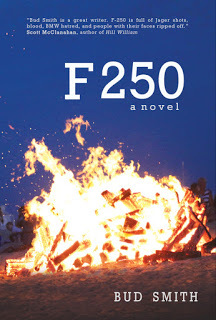
Steph Post: One of my favorite things about F 250 is how closely I could relate to many of the settings in the novel. The bar, the lagoon house (though I never lived in a place quite like that, I certainly had friends did), the parties. I’m extremely critical of writing that tries to capture this particular scene, and I felt that you did so flawlessly. How much of F 250 is based off of real life experiences, people and places and how much is pure fiction?
Bud Smith: It's based off my own life a touch. Nothing crazy. If the whole book was a house, my life in relation to it would just be that initial wood frame. Everything else tacked on makes it so much different from how things turned out. I feel like I don't know the narrator in real life, not as myself or anybody passing through my days. But he for sure drank at the same bars I did and his band was better than mine.
SP: Even with all of the in-your-face rawness and loudness of the novel, there were some quiet, poignant moments that really stuck with me. One of them was in the first chapter, when Lee is watching the ducks. In the midst of chaos, with one of his friends stumbling through the house with a bloody face at that very moment, Lee finds something special in those ducks. “One duck eats my purple Post-it note airplane. That duck is my favorite.” The first time I read that part, I was struck by its simplistic beauty. The Second time I read over it, the English teacher in me came out and all I could think of was Catcher in the Rye. So, a two part question: how do you think these quiet moments work in the scheme of F 250 and is Lee Casey akin in some way to Holden Caulfield? (how’s that for a loaded question?!)
BS: I love the quiet moments in books. There's all this hectic shit going on, and sometimes the story just needs to take a break and look out the window at some weird birds and marsh grass. That's where I'm at.
Lee Casey plays guitar in a noise band. He works heavy labor. But he's got Holden Caulfield's spirit a little bit. Maybe after Holden Caulfield gets kicked out of his rich kid preppy school and gets sent down to the local junkyard to torch cars apart. Haha. I liked Catcher In the Rye; I thought it was pretty dope that a book could be written like that, just this big mess slapped in a notebook and talking shit about people.
About the ducks. The purple note. Yeah, I'm not into proper written English. Grammar isn't my strong suit. Partly, I don't see the point, it's always changing. Language is always evolving. I don't see the point in holding on to a rigid 'right way to do it' in a medium as playful and as experimental as a novel. Plus, In ten/twenty/thirty years, novels will be full of emojis and text-speak, in addition to so many things we can't even imagine now. I'm cool with that. I haven't had any advanced English classes and I guess that shows, but that's cool with me too. I'm not going to be the guy explaining 'how to write' to a room full of masters of fine art. But I will chill with whoever wants to talk about the worst car crash they've ever been in, or the time they got arrested, or even the time they were flooded by the uncontrollable events of random life on earth that made them ditch the instruction manual, the preconceived notions, and do their own thing.
SP: Your prose style is very defined and I have a feeling its tight, staccato sentences will become a hallmark of your work. How much of this style is purely your natural voice and how much did you have to develop? Do you think the style accurately reflects the essence of the novel?
BS: The style, I hope, mirrors the mindset of the narrator, who is a little trapped. He's backed into a corner kind of. Let's say his mind isn't taking flight. He's doesn't close his eyes and soar over canyons on enormous falcons
SP: The style clearly works to create the voice of the narrator and is one of the reasons that the first person narration structure doesn’t drive me crazy. I usually can’t handle novels written in first person, but in this case, Lee’s voice was so authentic that I didn’t even notice the point of view. I was able to just enjoy the character and the story.
BS: I like when I'm at a party and talking to someone and they have me so locked into their story, that I forget I'm even at a party. I just keep leaning in closer and closer.
I'd say this style is one way I write, but sometimes it's not my go to. So maybe it's like 70% how I'd really write stylistically if all this was true and a memoir or something.
I will say the staccato sentence style of the book came from Twitter more than anything. At the time I wrote this, on my cellphone at work at the oil refinery, I was clicking out of the notepad app and going to Twitter to tweet things. I was in that short and sweet/brutal mode at the time.
SP: You wrote F 250 on your phone? I can’t even imagine what that would be like. How does that even work? How were you able to concentrate?
BS: Yeah, I wrote it in the notes app on my broken-screened iPhone 4. The battery was dying so quick though, that I had to write quick and charge it while I was out there welding.
I turned the phone sideways and tapped out the book with my thumbs, usually just in 1200 word-a-day chunks. I just did 40 days of that, usually at my day job on coffee breaks or lunchtimes when I wasn't too hungry.
Writing on my phone was no different than writing at my home computer or hand writing out a draft in a notebook. I try to focus on what I'm doing for 15 minutes at a time throughout the day until I hit the 1200 words I have planned. The only difference was that I have my phone in my pocket at all times (I have a new phone and it holds battery charge now, haha) and when I'm trying to write from a laptop or a desktop with a real keyboard, there's so many times when it's inconvenient. They say that a cellphone is the best camera, not because it takes the best pictures, but because it's always on you and how often do you have your $5000 Nikon with you?
SP: So much of F 250 revolves around music and the music scene. Lee, Seth and Ethan are musicians and some of the plot of the story involves a dream of getting out to LA and “making it.” The accuracy of this “scene” is one of the reasons I dug F 250 so much. Although the only instrument I can play is a radio and I won’t even sing in the shower because my voice is so awful, I spent a lot of time back in the day hanging out “at the show.” I met my husband when he was a drummer in a punk band and so many of my friends were and are musicians. Do you think readers who have no knowledge or concept of this world can relate to F 250? And if they can’t relate to it, can they still enjoy the story?
BS: Life is tough for everybody. I'm sure the readers get that struggle, the hassle of trying to break out of their ordinary existence. I think some non-music fans would be good with the book, for others it might fall flat. That's cool, though. I wrote the book with this one kid I know in mind. It's not the kind of book that'll touch the world.
SP: I don’t usually do this, but because I think you’re awesome and can handle it, I have to bring this up… K Neon and June Doom. While I do think these characters were well drawn and, honestly, accurate portrayals, the inclusion of these two girls irritated me to no end. There were several points where I rolled my eyes and thought to myself, “this is Such a guy book.” I think I felt that K Neon especially was too much of a guy’s wet fantasy and I felt that she, June and even Denise were jarring next to everything else that was real and gritty in the novel. So, where do these women really fit into the story? What do their characters and their roles mean for you and for the novel?
BS: To me they mean a much different thing than to the narrator of the book. The narrator is 23 and doesn't have a big picture of what women are yet. Hopefully he'll learn. When I was in my 20s I know I hadn't a clue. I was surrounded by people just like me, clueless and colliding into each other. That's what this book is about. That oblivious swagger. And it's not any of my business, but I didn't write this as a book for guys. I hope that's not too big a take away for anybody.
SP: Oddly enough, I didn’t get the feeling that you had written it for guys. That’s another thing that I love about F 250- it doesn’t seem to have an agenda. It’s pure.
BS: Remember when Chick Lit was a thing? I'm glad that label has vanished from the earth. The term Men's Fiction is just as bad- toss Men's Fiction into a volcano.
F-250 was written for everybody.
Everyone in this novel would make a pathetic saint, all of them deserve scrutiny. Probably K and June will come across as just a wet dream to some and Denise isn't the smartest person, and sleeps around within the group of friends, but Denise reminds me of where I'm from and who I knew, just like K and June do. Just like Trish does. June, K and Denise could each have their own novel, they're on the same weird quest that Lee Casey is. If those books were written, different characters would stand out as ill-fitting. In K Neon's version of this novel, Lee would be a self absorbed asshole who just floats through life. He'd come off just as cold and ruthless as she does.
I think that's what happens when you write about a group of misfits. Where do the women of the book fit into the story? They're slowly teaching the narrator about how the world is, or isn't, and I hope advancing the story in general in their own way.
SP: I guess what I was trying to get at was that I found their characters believable. I don't think they were far fetched or caricatures. I've known girls who act like them. I think what bothered me was that the 3 girls seemed to be related to Lee only in terms of sex. K Neon and June are major characters and I wanted more from them. And of course, there Was more to them than that, but it felt weaker than the rest of the story. Almost gratuitous.
You know, I think that perhaps the reason I felt their presence jarring was this: I felt like I could relate to Lee up until the focus becomes so much on sex. There was a shift to me (pg. 108 to be exact) where I felt like suddenly the girls in the book were becoming sex objects. If we're being honest, probably most guy readers don't even notice this and I could find this element so frustrating because I'm a female reader. I hate looking at things in terms of gender bias, but that's probably where I'm coming from with this. I wanted more realism and less sex from the female characters.
BS: Totally get that. I don't think it's fair to downplay "most guy readers;" people come to art how they come to it. Plenty of guys realize sex isn't everything. Most of them aren't 21 years old though. Time changes people. Relationships change as people know each other. For stints in real life, every once in a while you'll blink and look up and you're a sex object, and someone else is your sex object, too. That could feel good or it could feel lousy. You get to choose. There's purity and there's lust in fiction and in your waking reality. But you might also put on some shoes and go to a museum with your sex object and slice the world apart and talk about heavy things. Vice versa. But, in certain situations, guys think with their dicks, and if I'm writing from the point of view of a 23 year old guy, I don't have the heart to neuter him.
By the way, I think all the characters failed in F 250. Some exposed too much ugliness and others were too vain and others didn't have anything to say at all, and so remained quiet. I'm glad you fell in and out of love with this narrator. 108 pages is a good run for him. I believe the unreliable narrator is as close to art touching real life as we can get in a book, because the people in our lives, in society, they fail us, they surprise us, they come through with huge victories for us and then they accidentally light it all on fire. Sometimes the in-real-life people just want to fuck us for a week, and it happens and there's joy in it, but no profound influence enters our lifetime beyond that week. Other times mindless sex can be something that changes our lives. Chisel that on my tombstone.
SP: I’m going to argue with you there- I don’t think the characters failed at all. Just because I didn’t like the turn of events with the girls, doesn’t mean I think their characters weren’t real. In fact, I think you pose some great points here. And I don’t think that books have to please everyone and they don’t have to have balanced, political correct characters and portrayals. As long as the author is true to the character, I think the art works. In this case, I think you’ve done that with K Neon and June. More so, now that I think about, you’ve done it with Lee Casey. It is his story after all; we’re seeing it through his eyes. And I think that you stay true to him, even in his immaturity, throughout the breadth of the entire novel.
BS: What I mean by all the characters failing in F-250 is the closest I could see them, or find them, put them in the cage of this book, was to give them the same fuck-ups, flaws, indecisions and un-pinnable nihilism that I see around around me in the real world. There is love and hate in this book and on earth too, but good luck knowing for certain anyone's motivations. Mostly earth spins on an orbit of ambivalence. I wanted the characters in F-250 to survive car crashes. Some of them were driving. Some of them were in the passenger seat buckled up. Some were drunk and riding on the hood like it was a surfboard.
SP: With F 250, I believe you’ve really set down your mark as an author. What can we expect next from you?
BS: I have a novel coming out in the spring from Artistically Declined called I'm From Electric Peak about two love bird teenagers on the run across America after the girl's parents were shot by the boyfriend.
SP: Sounds very Natural BS: Never saw that movie. There's so many versions of that story, that all come from some mix of Bonnie and Clyde filtered through the Charles Starkweather killing spree (that spawned two of my favorite things, the movie Badlands with Martin Sheen and Sissy Spacek and the Bruce Springsteen album Bad Lands).
I'm From Electric Peak is a mashup of all those American kill-your-ma-and-pa-go-on-the-run tropes.
SP: And to wrap this all up- give me three music albums that you think have influenced your writing style and three books you’ve read in the past year that you think every reader should have on their shelf right now.
BS: For music: Black Moth Super Rainbow -- Cobra Juicy
The National -- The Boxer
Grimes -- Visions
For books:
Kathy Fish -- Together We Can Bury It (flash fiction that is unbelievably good)
Sara Lippman -- Doll Palace (short stories with remarkable depth and life)
Wildlives -- Sarah Jean Alexander (stunning poetry)
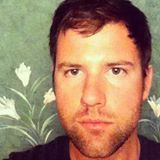
Many thanks to Bud Smith for stopping by and for not being afraid to dig deep into his own writing. Be sure to check out F 250 and be on the look out for more of Bud Smith and his balls-to-the-wall writing.

Steph Post: One of my favorite things about F 250 is how closely I could relate to many of the settings in the novel. The bar, the lagoon house (though I never lived in a place quite like that, I certainly had friends did), the parties. I’m extremely critical of writing that tries to capture this particular scene, and I felt that you did so flawlessly. How much of F 250 is based off of real life experiences, people and places and how much is pure fiction?
Bud Smith: It's based off my own life a touch. Nothing crazy. If the whole book was a house, my life in relation to it would just be that initial wood frame. Everything else tacked on makes it so much different from how things turned out. I feel like I don't know the narrator in real life, not as myself or anybody passing through my days. But he for sure drank at the same bars I did and his band was better than mine.
SP: Even with all of the in-your-face rawness and loudness of the novel, there were some quiet, poignant moments that really stuck with me. One of them was in the first chapter, when Lee is watching the ducks. In the midst of chaos, with one of his friends stumbling through the house with a bloody face at that very moment, Lee finds something special in those ducks. “One duck eats my purple Post-it note airplane. That duck is my favorite.” The first time I read that part, I was struck by its simplistic beauty. The Second time I read over it, the English teacher in me came out and all I could think of was Catcher in the Rye. So, a two part question: how do you think these quiet moments work in the scheme of F 250 and is Lee Casey akin in some way to Holden Caulfield? (how’s that for a loaded question?!)
BS: I love the quiet moments in books. There's all this hectic shit going on, and sometimes the story just needs to take a break and look out the window at some weird birds and marsh grass. That's where I'm at.
Lee Casey plays guitar in a noise band. He works heavy labor. But he's got Holden Caulfield's spirit a little bit. Maybe after Holden Caulfield gets kicked out of his rich kid preppy school and gets sent down to the local junkyard to torch cars apart. Haha. I liked Catcher In the Rye; I thought it was pretty dope that a book could be written like that, just this big mess slapped in a notebook and talking shit about people.
About the ducks. The purple note. Yeah, I'm not into proper written English. Grammar isn't my strong suit. Partly, I don't see the point, it's always changing. Language is always evolving. I don't see the point in holding on to a rigid 'right way to do it' in a medium as playful and as experimental as a novel. Plus, In ten/twenty/thirty years, novels will be full of emojis and text-speak, in addition to so many things we can't even imagine now. I'm cool with that. I haven't had any advanced English classes and I guess that shows, but that's cool with me too. I'm not going to be the guy explaining 'how to write' to a room full of masters of fine art. But I will chill with whoever wants to talk about the worst car crash they've ever been in, or the time they got arrested, or even the time they were flooded by the uncontrollable events of random life on earth that made them ditch the instruction manual, the preconceived notions, and do their own thing.
SP: Your prose style is very defined and I have a feeling its tight, staccato sentences will become a hallmark of your work. How much of this style is purely your natural voice and how much did you have to develop? Do you think the style accurately reflects the essence of the novel?
BS: The style, I hope, mirrors the mindset of the narrator, who is a little trapped. He's backed into a corner kind of. Let's say his mind isn't taking flight. He's doesn't close his eyes and soar over canyons on enormous falcons
SP: The style clearly works to create the voice of the narrator and is one of the reasons that the first person narration structure doesn’t drive me crazy. I usually can’t handle novels written in first person, but in this case, Lee’s voice was so authentic that I didn’t even notice the point of view. I was able to just enjoy the character and the story.
BS: I like when I'm at a party and talking to someone and they have me so locked into their story, that I forget I'm even at a party. I just keep leaning in closer and closer.
I'd say this style is one way I write, but sometimes it's not my go to. So maybe it's like 70% how I'd really write stylistically if all this was true and a memoir or something.
I will say the staccato sentence style of the book came from Twitter more than anything. At the time I wrote this, on my cellphone at work at the oil refinery, I was clicking out of the notepad app and going to Twitter to tweet things. I was in that short and sweet/brutal mode at the time.
SP: You wrote F 250 on your phone? I can’t even imagine what that would be like. How does that even work? How were you able to concentrate?
BS: Yeah, I wrote it in the notes app on my broken-screened iPhone 4. The battery was dying so quick though, that I had to write quick and charge it while I was out there welding.
I turned the phone sideways and tapped out the book with my thumbs, usually just in 1200 word-a-day chunks. I just did 40 days of that, usually at my day job on coffee breaks or lunchtimes when I wasn't too hungry.
Writing on my phone was no different than writing at my home computer or hand writing out a draft in a notebook. I try to focus on what I'm doing for 15 minutes at a time throughout the day until I hit the 1200 words I have planned. The only difference was that I have my phone in my pocket at all times (I have a new phone and it holds battery charge now, haha) and when I'm trying to write from a laptop or a desktop with a real keyboard, there's so many times when it's inconvenient. They say that a cellphone is the best camera, not because it takes the best pictures, but because it's always on you and how often do you have your $5000 Nikon with you?
SP: So much of F 250 revolves around music and the music scene. Lee, Seth and Ethan are musicians and some of the plot of the story involves a dream of getting out to LA and “making it.” The accuracy of this “scene” is one of the reasons I dug F 250 so much. Although the only instrument I can play is a radio and I won’t even sing in the shower because my voice is so awful, I spent a lot of time back in the day hanging out “at the show.” I met my husband when he was a drummer in a punk band and so many of my friends were and are musicians. Do you think readers who have no knowledge or concept of this world can relate to F 250? And if they can’t relate to it, can they still enjoy the story?
BS: Life is tough for everybody. I'm sure the readers get that struggle, the hassle of trying to break out of their ordinary existence. I think some non-music fans would be good with the book, for others it might fall flat. That's cool, though. I wrote the book with this one kid I know in mind. It's not the kind of book that'll touch the world.
SP: I don’t usually do this, but because I think you’re awesome and can handle it, I have to bring this up… K Neon and June Doom. While I do think these characters were well drawn and, honestly, accurate portrayals, the inclusion of these two girls irritated me to no end. There were several points where I rolled my eyes and thought to myself, “this is Such a guy book.” I think I felt that K Neon especially was too much of a guy’s wet fantasy and I felt that she, June and even Denise were jarring next to everything else that was real and gritty in the novel. So, where do these women really fit into the story? What do their characters and their roles mean for you and for the novel?
BS: To me they mean a much different thing than to the narrator of the book. The narrator is 23 and doesn't have a big picture of what women are yet. Hopefully he'll learn. When I was in my 20s I know I hadn't a clue. I was surrounded by people just like me, clueless and colliding into each other. That's what this book is about. That oblivious swagger. And it's not any of my business, but I didn't write this as a book for guys. I hope that's not too big a take away for anybody.
SP: Oddly enough, I didn’t get the feeling that you had written it for guys. That’s another thing that I love about F 250- it doesn’t seem to have an agenda. It’s pure.
BS: Remember when Chick Lit was a thing? I'm glad that label has vanished from the earth. The term Men's Fiction is just as bad- toss Men's Fiction into a volcano.
F-250 was written for everybody.
Everyone in this novel would make a pathetic saint, all of them deserve scrutiny. Probably K and June will come across as just a wet dream to some and Denise isn't the smartest person, and sleeps around within the group of friends, but Denise reminds me of where I'm from and who I knew, just like K and June do. Just like Trish does. June, K and Denise could each have their own novel, they're on the same weird quest that Lee Casey is. If those books were written, different characters would stand out as ill-fitting. In K Neon's version of this novel, Lee would be a self absorbed asshole who just floats through life. He'd come off just as cold and ruthless as she does.
I think that's what happens when you write about a group of misfits. Where do the women of the book fit into the story? They're slowly teaching the narrator about how the world is, or isn't, and I hope advancing the story in general in their own way.
SP: I guess what I was trying to get at was that I found their characters believable. I don't think they were far fetched or caricatures. I've known girls who act like them. I think what bothered me was that the 3 girls seemed to be related to Lee only in terms of sex. K Neon and June are major characters and I wanted more from them. And of course, there Was more to them than that, but it felt weaker than the rest of the story. Almost gratuitous.
You know, I think that perhaps the reason I felt their presence jarring was this: I felt like I could relate to Lee up until the focus becomes so much on sex. There was a shift to me (pg. 108 to be exact) where I felt like suddenly the girls in the book were becoming sex objects. If we're being honest, probably most guy readers don't even notice this and I could find this element so frustrating because I'm a female reader. I hate looking at things in terms of gender bias, but that's probably where I'm coming from with this. I wanted more realism and less sex from the female characters.
BS: Totally get that. I don't think it's fair to downplay "most guy readers;" people come to art how they come to it. Plenty of guys realize sex isn't everything. Most of them aren't 21 years old though. Time changes people. Relationships change as people know each other. For stints in real life, every once in a while you'll blink and look up and you're a sex object, and someone else is your sex object, too. That could feel good or it could feel lousy. You get to choose. There's purity and there's lust in fiction and in your waking reality. But you might also put on some shoes and go to a museum with your sex object and slice the world apart and talk about heavy things. Vice versa. But, in certain situations, guys think with their dicks, and if I'm writing from the point of view of a 23 year old guy, I don't have the heart to neuter him.
By the way, I think all the characters failed in F 250. Some exposed too much ugliness and others were too vain and others didn't have anything to say at all, and so remained quiet. I'm glad you fell in and out of love with this narrator. 108 pages is a good run for him. I believe the unreliable narrator is as close to art touching real life as we can get in a book, because the people in our lives, in society, they fail us, they surprise us, they come through with huge victories for us and then they accidentally light it all on fire. Sometimes the in-real-life people just want to fuck us for a week, and it happens and there's joy in it, but no profound influence enters our lifetime beyond that week. Other times mindless sex can be something that changes our lives. Chisel that on my tombstone.
SP: I’m going to argue with you there- I don’t think the characters failed at all. Just because I didn’t like the turn of events with the girls, doesn’t mean I think their characters weren’t real. In fact, I think you pose some great points here. And I don’t think that books have to please everyone and they don’t have to have balanced, political correct characters and portrayals. As long as the author is true to the character, I think the art works. In this case, I think you’ve done that with K Neon and June. More so, now that I think about, you’ve done it with Lee Casey. It is his story after all; we’re seeing it through his eyes. And I think that you stay true to him, even in his immaturity, throughout the breadth of the entire novel.
BS: What I mean by all the characters failing in F-250 is the closest I could see them, or find them, put them in the cage of this book, was to give them the same fuck-ups, flaws, indecisions and un-pinnable nihilism that I see around around me in the real world. There is love and hate in this book and on earth too, but good luck knowing for certain anyone's motivations. Mostly earth spins on an orbit of ambivalence. I wanted the characters in F-250 to survive car crashes. Some of them were driving. Some of them were in the passenger seat buckled up. Some were drunk and riding on the hood like it was a surfboard.
SP: With F 250, I believe you’ve really set down your mark as an author. What can we expect next from you?
BS: I have a novel coming out in the spring from Artistically Declined called I'm From Electric Peak about two love bird teenagers on the run across America after the girl's parents were shot by the boyfriend.
SP: Sounds very Natural BS: Never saw that movie. There's so many versions of that story, that all come from some mix of Bonnie and Clyde filtered through the Charles Starkweather killing spree (that spawned two of my favorite things, the movie Badlands with Martin Sheen and Sissy Spacek and the Bruce Springsteen album Bad Lands).
I'm From Electric Peak is a mashup of all those American kill-your-ma-and-pa-go-on-the-run tropes.
SP: And to wrap this all up- give me three music albums that you think have influenced your writing style and three books you’ve read in the past year that you think every reader should have on their shelf right now.
BS: For music: Black Moth Super Rainbow -- Cobra Juicy
The National -- The Boxer
Grimes -- Visions
For books:
Kathy Fish -- Together We Can Bury It (flash fiction that is unbelievably good)
Sara Lippman -- Doll Palace (short stories with remarkable depth and life)
Wildlives -- Sarah Jean Alexander (stunning poetry)

Many thanks to Bud Smith for stopping by and for not being afraid to dig deep into his own writing. Be sure to check out F 250 and be on the look out for more of Bud Smith and his balls-to-the-wall writing.
Published on August 19, 2015 10:59
August 18, 2015
Vito Says....
You should Vote for Steph Post for Best Local Fiction Writer in Creative Loafing's Best of the Bay competition. Vito knows. Be like the Vito.....


Published on August 18, 2015 13:05
August 17, 2015
Book Review: Bud Smith's F 250
Take a look at my latest book review: Bud Smith's reckless and wild novel F 250, posted over at Small Press Book Review. Read now and then stayed tuned for my interview with the author going up later this week.
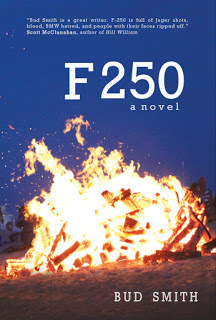

Published on August 17, 2015 10:04
August 13, 2015
Keep St. Pete Lit!
Many thanks to Keep St. Pete Lit for profiling me on their website. Check it out to learn more about me and also to keep up with all up the literary happenings in the Tampa Bay area.
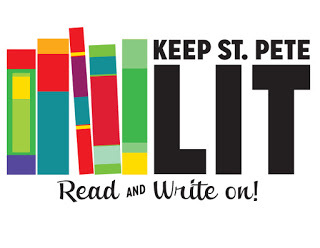

Published on August 13, 2015 10:27
August 12, 2015
No Bull, All Mountains: An Interview with Brian Panowich, Author of Bull Mountain
Unless you've been living under a rock the past few months, you've probably caught some of the buzz surrounding Brian Panowich and his debut novel
Bull Mountain
. Panowich and I share some eerie similarities, not the least of which is a love of Jack Russell terriers, and includes a taste in Southern crime fiction. Bull Mountain has everything you would want in this genre: outlaws, grit, violence and filial loyalties being smashed together and pulled apart, all with a literary grace that is both natural and surprising. It's no wonder that the accolades have been rolling in since its July debut and I have a feeling that they will continue to stack up for this no-nonsense author. I managed to catch up with Panowich in the midst of his first book tour and here's how the story goes...
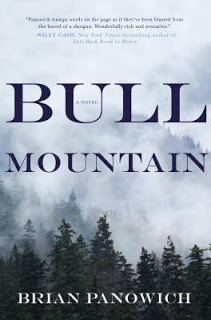
Steph Post: I identified so closely with your characters, themes and plot, so I’m going to do my best here to keep my connections out of it and focus on what makes Bull Mountain really stand out in its genre. One is the actual setting of North Georgia and Bull Mountain itself. The location where the story takes place is as integral to the novel as any of the human characters- do you think Bull Mountain could have taken place in any other location? How central really is the land to the story in your eyes?
Brian Panowich: I think the familial aspect of the story is universal. Family is complicated. Maybe not to the degree that I jacked it up to, but in most, if not all cases, everyone’s family, no matter how polished or perfect it may seem to the outside world, has a great deal of dysfunction playing out behind the curtain. So the story can appeal to anyone that wants to make themselves feel a little better about their own family issues by knowing there are way more broken ones out there, but as far as the motivation behind THIS particular family, the land and the right to live on it was paramount. The Burroughs’ hold nothing in higher regard then land and kin, and that aspect was absolutely essential to the novel. Without it, the story wouldn’t have been what I wanted it to be.
SP: Many crime novels have a very linear narrative structure that tumbles the reader one foot after the other down the road of the plot. Bull Mountain plays with time considerable, with generational timelines and multiple stories weaving together, which is yet another reason why the novel holds its own so strongly. In the writing process, how did you plan out these myriad working parts of the narrative? Were you always planning on structuring Bull Mountain this way?
BP: No. The truth is, I simply didn’t know how to do it. I’d never written a novel, and had no concept of how to structure a plot in the traditional three-act format. I just sat down and wrote. Having readers believe that what motivated these characters to do these terrible things was important to me. No one in this book thinks they are the bad guy. The bad guys rarely ever sees themselves that way, and if they do, it makes for a two-dimensional character. If I got to a scene where I needed the reader to feel sympathetic for someone, despite the horrid thing they might be doing, I just backed up and explained it. The format was just the product of my stream of consciousness method of writing at the time. I was worried that the book wouldn’t make any sense to anyone other than me, but it turns out that it is one of the book's strengths. It’s definitely a love it or hate it structure. The follow up I’m working on now is a very linear story that takes place over just a few days, and I promise there will be people out there that hate that, too, but it’s just how the story dictated itself. No plan. No rules.
SP: I’m not going to give anything away here, but I was warned by a fellow author that your first chapter packs a hell of a punch, and man, he wasn’t kidding. I think I honestly did a double take once I realized what had happened. From a craft perspective and a reader perspective, how important is a first chapter to a novel? Is it necessary for it to startle the reader in some way?
BP: I’m pretty proud of that chapter, and had it pointed out to me recently that it could be a short story in it’s own right. I never thought about that before, but I think they’re right. I think my background in writing short stories and flash fiction, where it’s really important to get in quick and get the job done, helped me out with that. I also wanted to set the tone of the novel from the jump. I like it when a book sets the hook early so I know exactly what I'm dealing with before I get invested. Flaps can be misleading. Marketing can too, but the first chapter should be akin to that first sip of bourbon. You either like it, or you don’t. I don’t think you have to startle a reader, so much as just set the tone. I like to know what I’m stepping into. Not everyone likes to read that way, but I do, and I figured I was writing this for folks like me anyway. If the first chapter doesn’t do it for you, go ahead and set it down. It’s cool. Pass it along to a buddy that might like it.
SP: With Bull Mountain, you are joining the ranks of authors writing in the complicated “country noir-grit lit-hillbilly crime-badass whatever you want to call it-genre” along with such greats as Daniel Woodrell and up and comers such as Smith Henderson, Wiley Cash, David Joy and Taylor Brown (whose Fallen Land will be out early next year). What is so attractive to you about this style and genre? Why do you think this genre has so suddenly become popular? Or has it?
BP: I don’t know for sure why it is becoming more popular, and I think I’m stealing someone else’s answer here when I say that the Southern region is under-exposed in this genre. The urban/city environment is so widely covered in books, TV, movies, etc. that the rural landscape is still rich with stories and mystery. I wasn’t necessarily attracted to this genre, either. I, of course, love all those authors you mentioned, and hold them in high regard, but I’m equally as influenced by Elmore Leonard, Dennis Lehane, and even more so by comic book writers like Frank Miller, Brian Michael Bendis, and Chris Claremont. So falling into this particular genre was basically due to the fact that I just happen to live here, and the landscape of this place is what I know. If I lived in a two-story walk-up in Queens, I’d most likely have written a story set there. Or if I still lived in the Panhandle of Florida, maybe I’d have picked that locale. (I read a book set around those parts that straight up kicked my ass. Wink.)
SP: Music has always been an integral part of your life. In what ways has playing music helped or hindered your ability to write fiction?
BP: Well, you could say that playing music hindered my ability to write by putting it off for about twenty years. My mom thinks so anyway. But the truth is, if it wasn’t for the life experience on the road and the stable of odd characters I met and the back file of mannerisms and region specific dialects I picked up while I was traveling, I don’t think my writing would ring as true. There’s only so much you can learn by reading other authors. You have to actively participate in life to be able to write it down. That’s what my career in music was for me—a massive two decade long character study.
SP: Bull Mountain just debuted on July 7th and as we speak, you are on your first book tour. Have the roller coaster emotions of being a successful debut author hit you yet?
BP: I still keep waiting to feel different, but I don’t. I feel blessed. I feel incredibly lucky, and maybe a little more validated that I may actually have some talent, but it’s still me brushing my teeth in the morning, hoping that the next thing I write doesn’t suck. You sent me this interview while I was out promoting Bull Mountain on my first ever book tour, which was an amazing and exhausting experience, but I’m just able to finish this for you over a month later, mostly because I spend a majority of my time battling wave after wave of crushing self doubt about the new book. There is a lot of reward in this business if you allow yourself to enjoy it, but for me, it’s mostly a debilitating focus on the next goal. I hope that changes at some point, but after talking to a ton of new and established writers this past year, it’s per the norm.
SP: What literary influences do you have that readers would find surprising?
BP: I mentioned earlier that I draw a lot from comic book writers. I’ve always been a nerd like that and the simple truth is, those comic books I devoured back in the day taught me how to tell a story. Frank Miller’s Daredevil and The Dark Night Returns, Chris Claremont’s X-men. Marv Wolfman and George Perez’ New Teen Titans. All the stories that are finally catching fire in Hollywood and on TV at the moment are the same stories I lived and breathed since I was eight years old. That’s why being compared to Steinbeck or Faulkner is so hard for me to swallow.
SP: I absolutely believe in sharing the wealth and the love when it comes to books, so, as always: who are you reading right now, or have read recently, that deserves a shout out?
BP: The Green Arrow #42 by Benjamin Percy is sitting next to me right now, and it’s amazing. Jamie Kornegay’s Soil is the best book I’ve read this year, and I just started Robert B. Parker’s Blind Spot by Reed Farrell Coleman in an attempt to keep myself from doing any writing of my own. That guy is good.
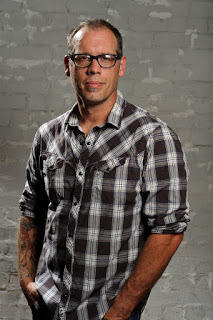
There you have it. Now go buy Bull Mountain for yourself and see what all the hype is about. Many thanks to Brian Panowich for stopping by. I'm sure we'll be seeing more of him in the future!

Steph Post: I identified so closely with your characters, themes and plot, so I’m going to do my best here to keep my connections out of it and focus on what makes Bull Mountain really stand out in its genre. One is the actual setting of North Georgia and Bull Mountain itself. The location where the story takes place is as integral to the novel as any of the human characters- do you think Bull Mountain could have taken place in any other location? How central really is the land to the story in your eyes?
Brian Panowich: I think the familial aspect of the story is universal. Family is complicated. Maybe not to the degree that I jacked it up to, but in most, if not all cases, everyone’s family, no matter how polished or perfect it may seem to the outside world, has a great deal of dysfunction playing out behind the curtain. So the story can appeal to anyone that wants to make themselves feel a little better about their own family issues by knowing there are way more broken ones out there, but as far as the motivation behind THIS particular family, the land and the right to live on it was paramount. The Burroughs’ hold nothing in higher regard then land and kin, and that aspect was absolutely essential to the novel. Without it, the story wouldn’t have been what I wanted it to be.
SP: Many crime novels have a very linear narrative structure that tumbles the reader one foot after the other down the road of the plot. Bull Mountain plays with time considerable, with generational timelines and multiple stories weaving together, which is yet another reason why the novel holds its own so strongly. In the writing process, how did you plan out these myriad working parts of the narrative? Were you always planning on structuring Bull Mountain this way?
BP: No. The truth is, I simply didn’t know how to do it. I’d never written a novel, and had no concept of how to structure a plot in the traditional three-act format. I just sat down and wrote. Having readers believe that what motivated these characters to do these terrible things was important to me. No one in this book thinks they are the bad guy. The bad guys rarely ever sees themselves that way, and if they do, it makes for a two-dimensional character. If I got to a scene where I needed the reader to feel sympathetic for someone, despite the horrid thing they might be doing, I just backed up and explained it. The format was just the product of my stream of consciousness method of writing at the time. I was worried that the book wouldn’t make any sense to anyone other than me, but it turns out that it is one of the book's strengths. It’s definitely a love it or hate it structure. The follow up I’m working on now is a very linear story that takes place over just a few days, and I promise there will be people out there that hate that, too, but it’s just how the story dictated itself. No plan. No rules.
SP: I’m not going to give anything away here, but I was warned by a fellow author that your first chapter packs a hell of a punch, and man, he wasn’t kidding. I think I honestly did a double take once I realized what had happened. From a craft perspective and a reader perspective, how important is a first chapter to a novel? Is it necessary for it to startle the reader in some way?
BP: I’m pretty proud of that chapter, and had it pointed out to me recently that it could be a short story in it’s own right. I never thought about that before, but I think they’re right. I think my background in writing short stories and flash fiction, where it’s really important to get in quick and get the job done, helped me out with that. I also wanted to set the tone of the novel from the jump. I like it when a book sets the hook early so I know exactly what I'm dealing with before I get invested. Flaps can be misleading. Marketing can too, but the first chapter should be akin to that first sip of bourbon. You either like it, or you don’t. I don’t think you have to startle a reader, so much as just set the tone. I like to know what I’m stepping into. Not everyone likes to read that way, but I do, and I figured I was writing this for folks like me anyway. If the first chapter doesn’t do it for you, go ahead and set it down. It’s cool. Pass it along to a buddy that might like it.
SP: With Bull Mountain, you are joining the ranks of authors writing in the complicated “country noir-grit lit-hillbilly crime-badass whatever you want to call it-genre” along with such greats as Daniel Woodrell and up and comers such as Smith Henderson, Wiley Cash, David Joy and Taylor Brown (whose Fallen Land will be out early next year). What is so attractive to you about this style and genre? Why do you think this genre has so suddenly become popular? Or has it?
BP: I don’t know for sure why it is becoming more popular, and I think I’m stealing someone else’s answer here when I say that the Southern region is under-exposed in this genre. The urban/city environment is so widely covered in books, TV, movies, etc. that the rural landscape is still rich with stories and mystery. I wasn’t necessarily attracted to this genre, either. I, of course, love all those authors you mentioned, and hold them in high regard, but I’m equally as influenced by Elmore Leonard, Dennis Lehane, and even more so by comic book writers like Frank Miller, Brian Michael Bendis, and Chris Claremont. So falling into this particular genre was basically due to the fact that I just happen to live here, and the landscape of this place is what I know. If I lived in a two-story walk-up in Queens, I’d most likely have written a story set there. Or if I still lived in the Panhandle of Florida, maybe I’d have picked that locale. (I read a book set around those parts that straight up kicked my ass. Wink.)
SP: Music has always been an integral part of your life. In what ways has playing music helped or hindered your ability to write fiction?
BP: Well, you could say that playing music hindered my ability to write by putting it off for about twenty years. My mom thinks so anyway. But the truth is, if it wasn’t for the life experience on the road and the stable of odd characters I met and the back file of mannerisms and region specific dialects I picked up while I was traveling, I don’t think my writing would ring as true. There’s only so much you can learn by reading other authors. You have to actively participate in life to be able to write it down. That’s what my career in music was for me—a massive two decade long character study.
SP: Bull Mountain just debuted on July 7th and as we speak, you are on your first book tour. Have the roller coaster emotions of being a successful debut author hit you yet?
BP: I still keep waiting to feel different, but I don’t. I feel blessed. I feel incredibly lucky, and maybe a little more validated that I may actually have some talent, but it’s still me brushing my teeth in the morning, hoping that the next thing I write doesn’t suck. You sent me this interview while I was out promoting Bull Mountain on my first ever book tour, which was an amazing and exhausting experience, but I’m just able to finish this for you over a month later, mostly because I spend a majority of my time battling wave after wave of crushing self doubt about the new book. There is a lot of reward in this business if you allow yourself to enjoy it, but for me, it’s mostly a debilitating focus on the next goal. I hope that changes at some point, but after talking to a ton of new and established writers this past year, it’s per the norm.
SP: What literary influences do you have that readers would find surprising?
BP: I mentioned earlier that I draw a lot from comic book writers. I’ve always been a nerd like that and the simple truth is, those comic books I devoured back in the day taught me how to tell a story. Frank Miller’s Daredevil and The Dark Night Returns, Chris Claremont’s X-men. Marv Wolfman and George Perez’ New Teen Titans. All the stories that are finally catching fire in Hollywood and on TV at the moment are the same stories I lived and breathed since I was eight years old. That’s why being compared to Steinbeck or Faulkner is so hard for me to swallow.
SP: I absolutely believe in sharing the wealth and the love when it comes to books, so, as always: who are you reading right now, or have read recently, that deserves a shout out?
BP: The Green Arrow #42 by Benjamin Percy is sitting next to me right now, and it’s amazing. Jamie Kornegay’s Soil is the best book I’ve read this year, and I just started Robert B. Parker’s Blind Spot by Reed Farrell Coleman in an attempt to keep myself from doing any writing of my own. That guy is good.

There you have it. Now go buy Bull Mountain for yourself and see what all the hype is about. Many thanks to Brian Panowich for stopping by. I'm sure we'll be seeing more of him in the future!
Published on August 12, 2015 11:49
August 11, 2015
Vote for Best of the Bay!
I'm thrilled to share that I have been nominated as a contender for Creative Loafing's Best of the Bay BEST LOCAL FICTION AUTHOR. I need your help to win, though. Voting is on from now until September 8th and it'd make my day if you'd join in and vote for me.
It's super easy- click the icon below, scroll down to Best Local Fiction Writer, click on my name, click submit. And -poof- you've made my day. I can't think of an easier way to help an author out.
Many, many thanks in advance!

It's super easy- click the icon below, scroll down to Best Local Fiction Writer, click on my name, click submit. And -poof- you've made my day. I can't think of an easier way to help an author out.
Many, many thanks in advance!

Published on August 11, 2015 11:17
August 10, 2015
Book Talk and Drinking
Many thanks to everyone who came out to Sawgrass Bar for Wordier Than Thou's Critical Drinking book club night. I was thrilled to have A Tree Born Crooked be August's book pick and even more excited to get the chance to discuss the book with readers. It was a wonderful night, full of interesting and insightful questions and commentary.
If you missed the event, but would like to read A Tree Born Crooked in your own book club, my publisher has announced a special discount for book clubs ordering the book. Please contact me for details.
Thanks again!
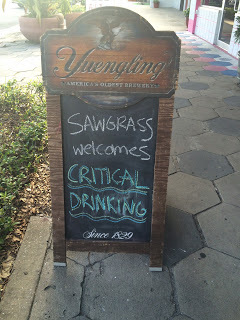
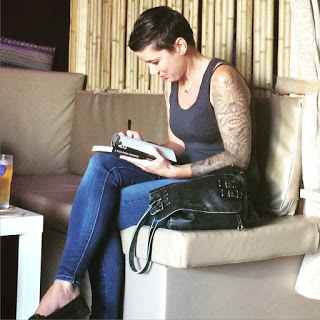
If you missed the event, but would like to read A Tree Born Crooked in your own book club, my publisher has announced a special discount for book clubs ordering the book. Please contact me for details.
Thanks again!


Published on August 10, 2015 10:56
August 6, 2015
The Beam
Many thanks for the shout-out on A Tree Born Crooked over at The Beam (Alternating Current Press). Here's an excerpt:
"Fans of Daniel Woodrell and Elmore Leonard will recognize the grit and burn in this book full of trumped-up crooks, tough women, and wicked plans."

"Fans of Daniel Woodrell and Elmore Leonard will recognize the grit and burn in this book full of trumped-up crooks, tough women, and wicked plans."

Published on August 06, 2015 10:27
July 27, 2015
Upcoming Event: Critical Drinking with Worider Than Thou
If you're local to the St. Pete area, come on out August 6th for the Critical Drinking book club discussion of A Tree Born Crooked. It's a book club. At a bar. This was sort of a match made in heaven for both me and the book. I'll be there to answer your questions (don't be shy!) and sign books.
More details can be found at the link below. Hope to see you there!
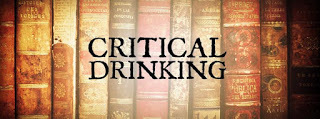
More details can be found at the link below. Hope to see you there!

Published on July 27, 2015 07:17
July 26, 2015
July Update
Just in case anyone was wondering, I did not fall of the face of the planet. (though at times it has felt like it)
I did, however, finish the first draft of my next novel, which is why I've pretty much isolated myself over the past 6 weeks.
And now I'm taking a short breathing-break, letting the manuscript simmer for two weeks and checking back in on the world. Hello, world. I'll be back in my hobbit hole again soon....
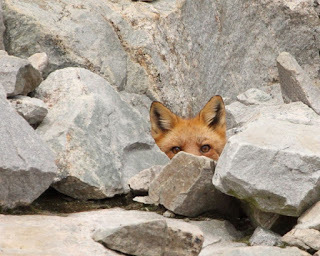
I did, however, finish the first draft of my next novel, which is why I've pretty much isolated myself over the past 6 weeks.
And now I'm taking a short breathing-break, letting the manuscript simmer for two weeks and checking back in on the world. Hello, world. I'll be back in my hobbit hole again soon....

Published on July 26, 2015 07:26



